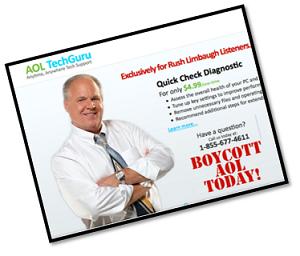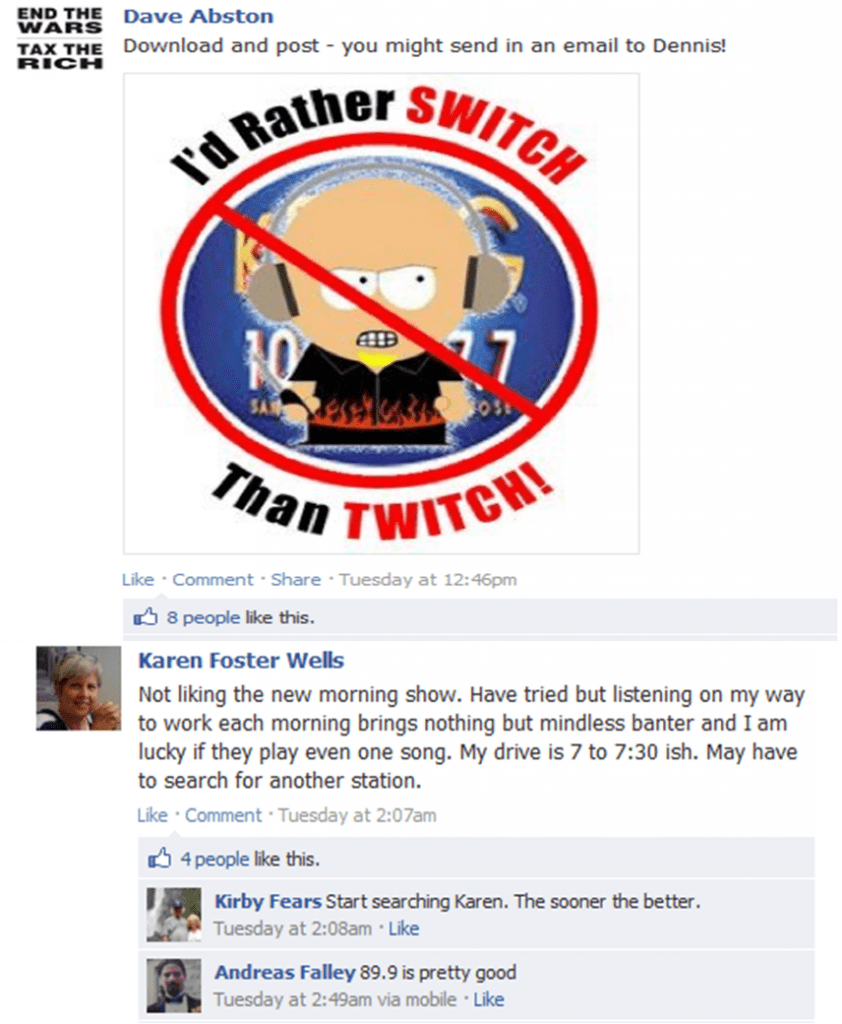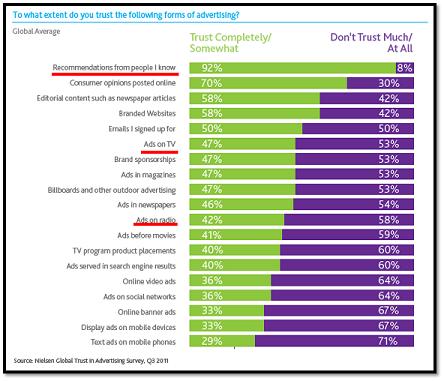We all work hard at building our brands, promoting our products, and trying to cash in on our equity – whether it’s radio or any other business.
That’s why we continue to hear clients ask us, “How can I make money on Facebook?” or “Where’s the ROI on Facebook?” As Lori Lewis has discussed many times in this space and on “Merge” in All Access, the real question should be, “How can I engender better relationships with the communities we serve?”
All of which will lead to more loyalty, listening, ratings, and revenue. At an NAB panel last April, she posited that social media’s best use is to make listeners feel like they matter – that every person counts.
This represents a different, more circuitous path than traditional radio people have ever walked. That’s because the same marketing/advertising model that we sell to clients is the one that most station managers and radio owners believe in, too.
The problem is, the world is changing, and consumers aren’t what they used to be.
 Actually, they are what they used to be.
Actually, they are what they used to be.
It’s just that their voice has changed, thanks to the digital/social revolution. They now have a power via social media and the real-time web they never enjoyed before. Hence, the Boycott Rush movement, the Arab Spring, and even the pressure that accompanied the first few weeks of the Trayvon Martin story. In all cases, consumers banded together for a common cause, informed each other, and crowd-sourced their way to a movement that was hard to ignore.
It’s happening in radio at the local market level, too. The story out of Lincoln, Nebraska, earlier this year that Three Eagles Broadcasting had sent a C&D to an ad hoc group of listeners who were angry with the station’s decision to change morning shows is a case in point. Organizing an advertiser protest against the station’s decision to fire its local show in place of a syndicated one, this little group was scared off by the company’s lawyers who cited that their efforts were causing “damage” to the station’s advertising efforts. But we shouldn’t miss the overall importance of what they accomplished.
And recently at one of radio’s most venerable brands, KFOG in San Francisco, listener protests via social media were responsible for taking down a new morning show – just two weeks into its existence. The demise of “KFOG in the Morning with Tony, Greg & Melanie” came so fast that most of us didn’t even have a chance to hear the show. And their cancellation had nothing to do with PPM.
Outraged listeners took over the station’s Facebook page, expressing their distaste for this new show on their precious station. This had to be a record for a new show’s axing in a major market, and the station has angry listeners to thank for possibly saving it from a longer-term ratings debacle.
In the old days, stations could simply clam up, take cover, and ride it out. Or they could “disappear” a PD, morning show, or popular DJ, and perhaps respond to the handful of letters that drifted in. Today, listeners have the networks, the transmitters, and the digital juice to take matters into their own hands, grow their cumes, and build their own followings based on a sense of shared interests – and trust.
Nielsen confirms this in its recently released Global Trust In Advertising Survey. Across the world, 92% of consumers would rather go along with the word of family and friends – above all other forms and sources of communications.
Trust in paid traditional media continues to go down by at least 20% since 2009. While nearly half (47%) of consumers globally say they trust media, the drops in recent years are stunning.
This might also explain why so many young people have little loyalty to the companies that employ them, moving from job to job, rather than trusting in the firms that hire them.
And it’s why our efforts at Jacobs Media in social media have amped up in the past couple years. Your Facebook brand page and morning show tweets may not replace the need for mass marketing anytime soon. But letting your audience communicate their opinions and values to one another trumps traditional efforts that include direct mail, email marketing, and the paid ads that some stations run.
We may be able to manipulate their listening to eke out a good weekly in PPM, but in the long haul, the strength of the relationships radio nurtures with fans isn’t going to come from billboards or email blasts hyping this weekend’s deals.
If you do a great job with your content and you care, that attitude will be communicated to fans who now have their own audiences and communities.
We recommend you market socially and traditionally, of course, but understanding that a recommendation from a friend (or even a stranger) often trumps all the data and advertising you can aggregate. This speaks volumes about the changing nature of the relationship between the consumer and the brands they use.
So when you ask the audience, “Who do you trust?”
Don’t be surprised when they say, “Each other.”
Full disclosure: Jacobs Media works for Entercom in San Francisco.
- What To Do If Your Radio Station Goes Through A Midlife Crisis - April 25, 2025
- A 2020 Lesson?It Could All Be Gone In A Flash - April 24, 2025
- How AI Can Give Radio Personalities More…PERSONALITY - April 23, 2025






I agree, Paul, but I don’t think relationship selling, or the importance of word of mouth is anything new. The fact that people can aggregate is nothing new, either. People used to be able to slap that 5 cent stamp on an envelope en masse. I just think radio management is *finally* starting to pay attention.
Social is like gasoline. It’s now easier than ever for listeners to band together, find each other, collaborate, and have an impact. This is why transparency is so important.
I wonder where “celebrity endorsement’ or “local personality (DJ) endorsement” would have ranked…or was that part of the “people I know” score?
My guess is not very high, Jay. But it’s a good question because radio stations typically command higher rates for these spots. Focus and LAB groups we conduct often tell us these spots are more entertaining than their produced counterparts. But when there are too many, they lose credbility. Thanks for commenting.